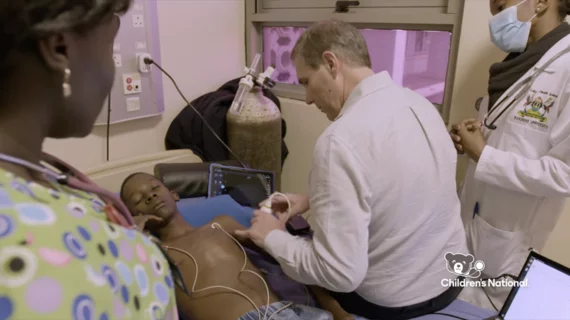AI spots signs of rheumatic heart disease in echocardiograms as well as cardiologists
Advanced artificial intelligence (AI) models can detect signs of rheumatic heart disease (RHD) in routine echocardiograms of children as well as cardiologists, according to new findings published in the Journal of the American Heart Association.[1]
Because the algorithms can be used with handheld echocardiogram devices, researchers think this represents a potential breakthrough for pediatric patients in low- and middle-income countries where RHD remains a significant threat.
“This technology has the potential to extend the reach of a cardiologist to anywhere in the world,” co-lead author Kelsey Brown, MD, a third-year cardiology fellow with Children’s National Hospital in Washington, D.C., explained in a statement. “In one minute, anyone trained to use our system can screen a child to find out if their heart is demonstrating signs of RHD. This will lead them to more specialized care and a simple antibiotic to prevent this degenerative disease from critically damaging their hearts.”
Brown et al. used a mix of deep learning and machine learning to develop their AI model, which focused on localizing the patient’s left atrium during systole and identifying signs of mitral regurgitation. By the team’s calculations, the model can already analyze nearly 40 features of the heart associated with RHD that a cardiologist is not able to see with the naked eye.
“Our algorithm can see and make adjustments for the heart’s size as a continuously fluid variable,” co-lead author Pooneh Roshanitabrizi, PhD, a staff scientist with the Sheikh Zayed Institute for Pediatric Surgical Innovation at Children’s National Hospital, said in the same statement. “In the hands of healthcare workers, we expect the technology to amplify human capabilities to make calculations far more quickly and precisely than the human eye and brain, saving countless lives.”
The next step for this research is already underway; a pilot program launches in March focused on how AI models can be introduced to echocardiogram screening programs in Uganda. Researchers think a simple setup consisting of a handheld ultrasound probe, a laptop computer and a tablet are all healthcare providers would need to use the new algorithm on every patient evaluated by the screening program.
“One of the most effective ways to prevent rheumatic heart disease is to find the patients that are affected in the very early stages, give them monthly penicillin for pennies a day and prevent them from becoming one of the 400,000 people a year who die from this disease,” Craig Sable, MD, associate division chief of cardiology with Children’s National Hospital and one of the cardiologists behind the new pilot program, explained.
Click here to read the team’s full study in the Journal of the American Heart Association.

